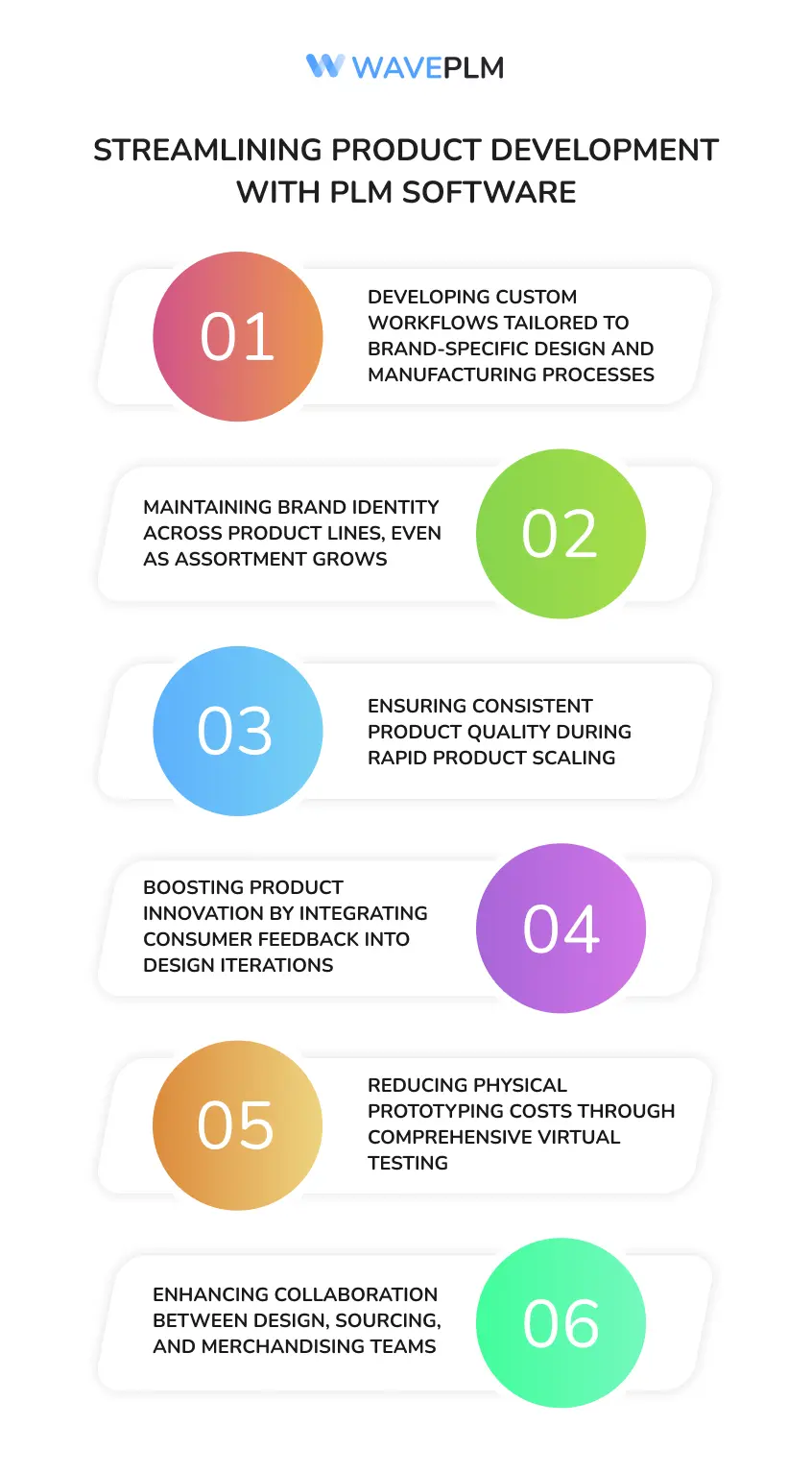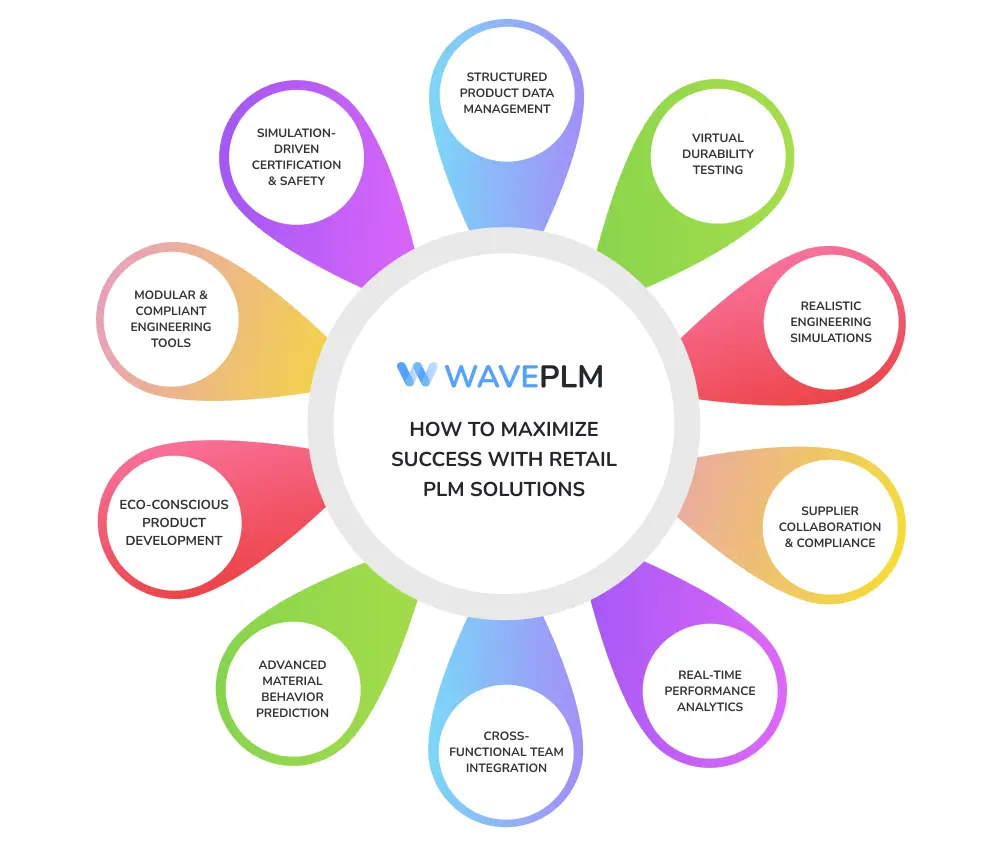
Introduction to Product Lifecycle Management
In today’s dynamic and fast-moving retail industry, companies must manage increasingly complex supply chains and launch innovative products faster than ever before to meet evolving customer demands. Retail PLM solutions have become critical for improving product lifecycle management efficiency and significantly reducing time to market.
PLM software solutions foster a collaborative environment that facilitates communication and real-time collaboration across design, sourcing, product development, and manufacturing teams. With a robust digital manufacturing solution, retailers gain a critical competitive advantage by enhancing product quality, integrating sustainable practices, and accelerating innovation cycles.
Product lifecycle management PLM platforms manage every critical step — from initial ideation and concept development through design, production, quality control, distribution, and post-launch product monitoring. They enable companies to create realistic virtual prototypes, accurately predicting product performance, and maintain quality standards throughout the product lifecycle.
Benefits of PLM in Retail
Implementing a PLM solution revolutionizes product operations within the retail business and brings substantial strategic benefits:
|
Feature |
Benefit |
|---|---|
|
Centralized Product Data |
Ensures version control features and accurate collaboration |
|
Real-Time Supplier Collaboration |
Navigates complex supply chains with better visibility |
|
Optimizing Sustainable Materials |
Integrates sustainable material considerations seamlessly |
|
Advanced Quality Control |
Maintains consistent product quality throughout the lifecycle |
|
Maintaining Product Quality |
Ensures high standards throughout the product lifecycle |
|
Accelerated Product Introduction |
Increases product introduction success and reduces delays |
|
Implement Efficient Design Processes |
Facilitates concurrent engineering and reduces lead times |
|
Digital Prototyping and Testing |
Conducts virtual durability testing and simulates real-world use |
|
Assembly Management Tools |
Supports synchronized product development store factory processes |
|
Materials Informatics Capabilities |
Evaluate sustainable material options and optimize material usage |
PLM platforms like Wave PLM deliver sophisticated quality management features that help brands monitor quality trends, manage supplier collaboration efficiently, and protect their brand reputation by ensuring consistent product quality across all markets.
Streamlining Product Development
With retail PLM, brands can implement efficient and repeatable design processes that dramatically reduce rework, lower costs, and shorten product development timelines. Using sophisticated engineering tools, brands can implement efficient and repeatable design processes that dramatically reduce rework, lower costs, and shorten product development timelines. Simultaneous product development stages foster continuous iteration and encourage innovation.
Using materials informatics capabilities, companies can thoroughly evaluate sustainable material options, compare material properties, and choose the best fit based on performance and cost requirements. Digital manufacturing capabilities allow brands to create adaptive components, highly accurate digital representations, and predictive models of product performance. Expertise helps companies maximize the use of simulations, facilitating smoother certification by reducing physical testing cycles and ensuring compliance with safety standards.
PLM enables:
- Developing custom workflows tailored to brand-specific design and manufacturing processes
- Maintaining brand identity across product lines, even as assortment grows
- Ensuring consistent product quality during rapid product scaling
- Boosting product innovation by integrating consumer feedback into design iterations
- Reducing physical prototyping costs through comprehensive virtual testing
- Enhancing collaboration between design, sourcing, and merchandising teams
The ability to create adaptive product components and simulate complex scenarios ensures smarter, faster, and more sustainable product launches.

Managing Complex Supply Chains
Retailers today face increasing complexity in their global operations, dealing with diverse suppliers, shifting regulations, and consumer expectations for transparency. Retail PLM solutions help brands successfully navigate complex supply chains, enhance supplier collaboration, and align with sustainability initiatives.
Key supply chain improvements achieved through PLM:
|
Area |
PLM Advantage |
|---|---|
|
Supplier Collaboration |
Real-time performance tracking, audit readiness |
|
Sustainable Material Usage |
Optimizing material usage and integrating eco-friendly sourcing |
|
Manufacturing Processes |
Lean manufacturing tools support efficient workflows |
|
Manufacturing Process |
Supports quality control, regulatory compliance, and effective project management |
|
Quality Control Inconsistencies |
Quality control measures ensure consistent product outcomes |
|
Monitoring Quality Trends |
Companies establish control limits and proactively audit suppliers |
|
Environmental Compliance |
Rapid adaptation to evolving environmental regulations |
|
Rapidly Evolving Environmental Regulations |
Facilitates compliance and adaptation to changing regulations |
By adopting product lifecycle management software, brands ensure better supply chain transparency, drive environmental responsibility, and significantly enhance product quality.
Agile Deployment
In a retail landscape defined by rapid trend cycles and shifting consumer preferences, agility is crucial. PLM platforms support agile deployment strategies through:
- Conducting comprehensive testing scenarios digitally before physical production
- Creating realistic virtual prototypes to evaluate product designs under multiple conditions
- Modeling complex loading and wear scenarios using advanced simulation tools
- Rapidly adjusting to new environmental regulations and market demands
- Version control features ensure that multiple team members can effectively collaborate on a project by maintaining access to the latest information.
Simulation engineers enable businesses to develop effective testing strategies that reduce physical prototyping, lower material costs, and increase product introduction success. Agile deployment also boosts product innovation by allowing real-time iterations during early-stage development.
Selection Criteria for PLM Software
Choosing the right PLM software solutions requires careful strategic evaluation based on specific business needs:
- Retail-specific features in product lifecycle management software
- Biovia data management features and integrated material comparison tools
- Seamless integration with enterprise resource planning (ERP) systems and additive manufacturing fragmented software ecosystems
- Strong assembly management tools connecting product development, store, and factory teams
- Advanced simulation tools to develop effective and environmentally conscious products
- Support for sustainable material usage and optimizing sustainable material options
- Robust collaboration tools to foster a cohesive product development ecosystem
- Collaborative environment facilitates communication and data sharing across the supply chain.
- Robust digital manufacturing solution to optimize inspection processes and ensure effective quality control.
Selecting a PLM platform that offers scalable, flexible, and sustainability-driven features ensures better long-term ROI and operational success.
Implementing PLM Solutions
A successful PLM implementation involves:
- Conducting detailed user research to define current challenges and future needs
- Prioritizing integration of lean manufacturing tools and sustainability initiatives
- Creating structured rollout timelines and comprehensive user training programs
- Choosing engineering simulation services to accurately predict product performance and durability
- Establishing rigorous quality management features to monitor and resolve early-stage inconsistencies
- Developing simulation-based strategies to enhance product development outcomes
- Building collaborative workflows that align design and manufacturing teams
- Implement efficient design processes to facilitate concurrent engineering and reduce lead times.
- Maintaining product quality while implementing waste minimization strategies throughout the entire product lifecycle.
Retailers that invest in strategic PLM implementation initiatives dramatically enhance operational efficiency, increase innovation, and achieve consistent product quality.
Best Practices for PLM
To maximize success with retail PLM solutions, brands should:
- Maintain clean, structured product data throughout the product lifecycle
- Implement effective virtual durability testing strategies to validate product strength and functionality
- Use engineering simulation services to create realistic virtual models and reduce dependency on costly physical prototypes
- Monitor and manage supplier collaboration to ensure consistent compliance and material quality
- Continuously refine design and manufacturing processes through real-time performance analytics
- Foster an integrated, cross-functional culture between development, store, and factory teams
- Accurately predict material behavior under different conditions with sophisticated simulation and data management tools
- Incorporate environmental considerations into every stage of the product development process
- Use sophisticated engineering tools to meet the demands for modular and sustainable products while ensuring compliance with regulatory standards.
- Expertise helps companies maximize the use of simulations, facilitating smoother certification by reducing physical testing cycles and ensuring compliance with safety standards.
Following these best practices ensures that brands not only meet market demands but also lead innovation and sustainability initiatives in the competitive retail space.

Future of PLM in Retail
The future of Product Lifecycle Management (PLM) in retail is set to be shaped by several transformative trends and technologies. One of the most significant trends is the increasing importance of supply chain management and optimization. As retailers strive to reduce their time to market and enhance product quality, they will need to adopt robust digital manufacturing solutions that enable them to navigate complex supply chains and collaborate effectively with suppliers.
Another key trend is the growing focus on sustainability and environmental responsibility. Retailers will need to prioritize optimizing sustainable material usage and integrating sustainable material considerations into their product development processes. This will require the use of PLM software solutions that can help them evaluate sustainable material options, monitor quality trends, and ensure consistent product quality throughout the product lifecycle.
The use of lean manufacturing tools and techniques will also become more prevalent in the retail industry. By implementing efficient design processes and conducting virtual durability testing, retailers can reduce physical prototyping costs and boost product innovation. Additionally, the adoption of additive manufacturing and other digital manufacturing capabilities will enable retailers to create highly accurate digital representations of their products and simulate complex loading scenarios.
To stay competitive in the rapidly evolving retail landscape, companies will need to establish control limits and develop effective testing scenarios that take into account performance and cost requirements. They will also need to prioritize supplier collaboration and implement a collaborative environment that facilitates communication and data sharing across the supply chain.
The future of PLM in retail will also be shaped by the increasing importance of quality management features and quality control measures. Retailers will need to address quality control inconsistencies and monitor quality trends to ensure consistent product quality. By using PLM solutions that offer version control features and materials informatics capabilities, retailers can enhance product quality and reduce the risk of quality control inconsistencies.
Ultimately, the future of PLM in retail will be characterized by the increasing use of digital technologies and data-driven decision-making. By adopting PLM software solutions that offer advanced simulation tools, engineering simulation services, and biovia data management features, retailers can navigate complex business processes, reduce quality control inconsistencies, and improve product introduction success.
In terms of specific technologies, the future of PLM in retail will likely involve the increasing use of artificial intelligence (AI) and machine learning (ML) to analyze data and make predictions about product performance. The use of Internet of Things (IoT) devices and sensors will also become more prevalent, enabling retailers to collect data on product usage and performance in real-time.
Overall, the future of PLM in retail will be shaped by a combination of technological, environmental, and social trends. By prioritizing sustainability, quality, and collaboration, retailers can stay competitive in a rapidly evolving marketplace and deliver high-quality products that meet the needs of their customers. WavePLM retail PLM is one example of a PLM solution that can help retailers achieve these goals by providing a collaborative environment that facilitates communication and data sharing across the supply chain.
Conclusion
In 2025 and beyond, leading brands in the retail industry will increasingly rely on advanced retail PLM solutions to thrive in an intensely competitive marketplace.
PLM platforms empower companies to:
- Enhance product quality while reducing time to market
- Boost product innovation through rapid, agile development cycles
- Optimize sustainable material usage and contribute to environmental initiatives
- Maintain brand reputation by ensuring consistent product quality worldwide
- Accurately predict product performance and costs before production starts
- Navigate complex supply chains with better transparency and supplier management
- Develop realistic virtual prototypes, model complex loading scenarios, and conduct virtual durability testing with advanced simulation tools
- Implement effective simulation strategies to reduce physical prototyping costs and increase product introduction success
With the integration of lean manufacturing tools, materials informatics capabilities, quality control measures, and collaborative environment platforms, product lifecycle management PLM transforms retail businesses into agile, resilient, and future-ready leaders.
Ready to elevate your retail business to new heights? Embrace the power of modern PLM today and secure your brand’s success in the future of commerce. 🚀





Leave a Reply